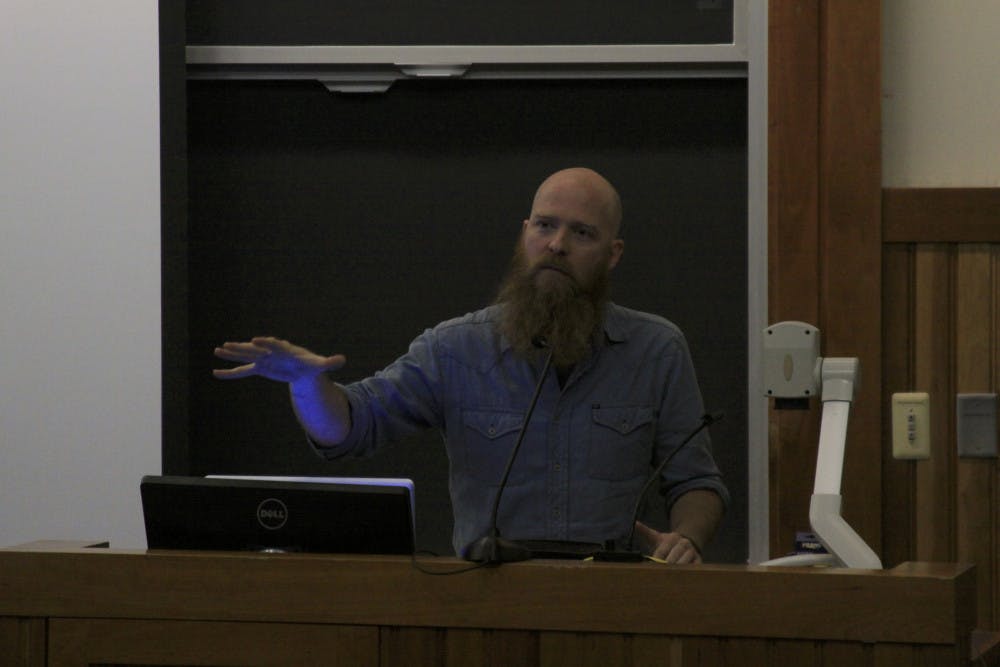Family. Environment. Change. These are the three simple yet strong words with which award-winning director Chad Stevens describes his new documentary, Overburden, which was screened on Thursday September 17 in McCardell Bicentennial Hall.
The title of the documentary refers to all the material that lies above a coal seam: the rock, soil and organic matter that must be dynamited and removed to access the resource. The documentary follows two West Virginian women with dichotomous stances on coal as they come together and find common ground to challenge the irresponsible practices of Massey Energy, the country’s fourth largest coal company.
Dedicated grandmother and community organizer Lorelei Scarboro, who lost her husband to black lung, vehemently campaigns against coal mining because of the peril it poses to her family and neighbors. She leads a grassroots movement aiming to stop Massey Energy from exploiting Coal River Mountain, the last major intact mountain in the Coal River Watershed and a promising site for significant wind energy.
“This isn’t coal mining,” she said of mountain top removal, the brutal operation that has flattened hundreds of mountains and killed mineworkers in order to access coal more easily. “This is the rape of Appalachia!”
In the documentary, Lorelei finds an unlikely ally in Betty Harrah, a staunch supporter of the economic lifeblood that is coal in Appalachia. In April 2015, when Harrah received a call informing her that her beloved brother had perished in a massive mine explosion claiming 29 men’s lives, she bitterly realized that the industry prioritizes profits over people’s welfare.
The two women join forces to establish the first wind farm in coal country on the ridges of Coal River Mountain. They hope this will provide a safer, more sustainable economic foundation in Appalachia and bridge the intense divide over coal in their community.
Director Chad Stevens was inspired to produce Overburden by his experience photographing mountaintop removal sites and meeting people affected by them.
“The families living in the valleys below these massive mining complexes, I saw how their lives were changed, sometimes destroyed, sometimes ended too early,” he told students after screening the film. “This also changed me and ultimately led me to create this film that not only tells of the environmental destruction of coal mining but also the impacts on communities and families.”
The filming process taught Stevens that some narratives require time to be told with impact.
“It’s because I had time — nearly ten years — that I was able to create an intimate story that hopefully really takes viewers into the lives, struggles and joys of these families,” he said.
After watching the film, Human Ecology major Adrian Leong ’16.5 was struck by how such long-term journalism helps the storyteller and story evolve.
“Because [Stevens] stayed with the community he was reporting on for as long as he did, he changed; and because he changed, the story changed,” he said.
The most difficult aspect of creating the film, Stevens said, was obtaining the trust of the documented community, which is wary and defensive after past abuse by the media.
“It took years for me to build their trust and gain access to the families who eventually allowed me to tell their stories,” he said.
Even so, the director attributes the film’s realization to Lorelei and Betty.
“Any success the film may have, which I would define as creating empathy in those who see the film, is only because the subjects in the film were courageous enough to share their stories,” he said. “They are courageous, inspiring women, and I am forever grateful for their openness.”
With twice as many people now working for the solar power industry as for the coal industry, Stevens points out that coal is in terminal decline.
“That is also the challenge. What will happen to those miners who still need to feed their kids, take care of their parents and pay their mortgage? This is what I hope audiences take away from the film. It’s complicated.”
Overburden delivers a message of solidarity in the face of the complexity and contention surrounding coal.
“Even though from the outside it may be easy to declare right and wrong, when you are living it, and when, as a viewer, you are there with them as they are living this life, I hope that it becomes clear that we are all one, that we all want the best for our children and that we can learn from each other along the way,” Stevens said.
Emmy-Winning Director Screens Coal Mining Documentary

Comments


